The first women to compete in the Olympic Games played a quiet croquet match in a cauldron of trees and grass in Paris in 1900. There was only one paying spectator, an unnamed “gentle Englishman,” as the official Olympic report recalls. Since then, the games have changed immensely. One of the biggest changes has been the support and addition of women’s sports. Today, these sports have placed women in the athletic spotlight making some of these competitions the most closely followed games in the Olympics. From these games, I have selected the top ten greatest female athletes in Olympian history.
In an effort to maintain objectivity in determining the top ten greatest female athletes in modern Olympian history, I used the Luchies Olympic Formula (LOF) for medals in which Gold = 5 Points; Silver = 3 Points; Bronze = 2 Points to obtain a point total for each athlete. In doing so, I was able to rank the top ten greatest female athletes according to the total scores on the LOF. While everyone may not agree with this methodology, I think most will agree that all these outstanding achievements should be celebrated.
10. Amy Van Dyken
Medals: 6 Gold = 30 points
When Amy Van Dyken was in high school, her swimming teammates teased her. They said she swam so slowly that they did not want her on their team anymore. Other students made fun of Van Dyken because she was so tall and acted like a “nerd.” In addition to the teasing, she also suffered from asthma, a disease that made it so hard for her to breathe that she could not even climb stairs. Despite all these obstacles, Van Dyken kept swimming. Soon she was so good that she became the star of her team. In July 1996, at the Summer Olympics in Atlanta, Georgia, Van Dyken swam into the record books by becoming the first American woman to win four gold medals in one Olympic Games.
9. Natalie Coughlin
Medals: 3 Gold; 4 Silver; 4 Bronze = 35 points
Natalie Coughlin burst onto the international swim scene at the 2001 World Championships, winning a gold medal in the 100 backstroke and a bronze in the 50 backstroke. In 2002 at the Pan-Pacifics, she was more dominant, winning six medals, four gold with three individual championships in the 100-free, 100-fly, and 100-back. Coughlin was an early favorite for the 2004 Olympics, but her performance in 2003, and especially at the World Championships, was unimpressive. There she won only two relay medals, although it was later revealed that she was quite sick and had considered not competing. Although somewhat overshadowed by the media attention given Michael Phelps, Coughlin was the top female swimmer at the 2004 Olympic Games, winning five medals, including two gold. Individually, she won the 100 meter backstroke and finished third in the 100 freestyle. She won her second gold medal in the 800 meter freestyle relay and added two silvers as a member of the United States’ teams in the other relays.
Coughlin continued after 2004 and won a 4×200 freestyle relay gold medal at the 2005 World Championships. In 2007, she won the 100-backstroke and 200-freestyle at the Worlds, adding a gold medal in the 4×2 free relay. In Beijing, she was again eclipsed by the frenzy that surrounded American swimmers Michael Phelps and Dara Torres. But she competed in six events, winning a medal in all of them, highlighted by an individual gold medal in the 100 backstroke, becoming the first woman to defend that Olympic title. In two Olympics, she competed in 11 events and won 11 medals, three gold.
8. Polina Astakhova
Medals: 5 Gold, 2 Silver, 3 Bronze = 37 points
For number eight on our list, we have a tie between two great female athletes, Polina Astakhova and Raisa Smetanina. Polina Astakhova won team gold medals at the 1956, 1960 and 1964 Olympic Games, a feat that she shares with Larisa Latynina, making them the only gymnasts to be members of three gold-medal winning teams. Astakhova also won gold on the uneven parallel bars and placed third in the individual all-around in both 1960 and 1964. She added silver medals in both 1960 and 1964 in the floor exercises, and her final Olympic tally included 10 medals, five gold, three silver, and two bronze. At the world championships she was less successful, but was a member of the Soviet Union team that won the team title in both 1958 and 1962.
8. Raisa Smetanina
Medals: 4 Gold; 5 Silver; 1 Bronze = 37 points
Over a long career that encompassed five Olympics, Raisa Smetanina compiled one of the greatest records of any female cross-country skier. She grew up in an area near the Ural Mountains called Komi, where she learned to ski in the frigid winters. A loner, she grew up as an only child, and remained single throughout her long career, focusing almost exclusively on her skiing. She began skiing in 1967 and was first named to the Soviet national team in 1972. Smetanina first came to international attention at the 1974 World Championships where she finished first in the 5-kilometer and helped the Soviet Union relay team to win the championship. This led to her greatest Olympic performance at Innsbruck in 1976. She competed in three events, medaling in all three, with silver in 5 kilometers; and gold in the 10-kilometer and the relay.
Smetanina competed at the Olympic Winter Games in 1976, 1980, 1984, 1988, and 1992, retiring after the Albertville Olympics. During that time, she won 10 Olympic medals, including four gold. Two of the gold medals came in 1976, and she added another individual gold in the 1980 5-kilometer.
Smetanina’s Olympic career ended when she helped the Soviet women’s relay team to a gold at the 1992 Winter Olympics. Her gold medal in the relay came only 12 days before her fortieth birthday, making her the oldest female gold medalist in Olympic Winter history.
Raisa Smetanina also won 13 medals at the World Championships. Of these, three were gold medals, including relay titles with the Soviet Union team in 1974 and 1985. Her only individual world title came in the 20-kilometer in 1982. In addition to her international triumphs, Smetanina was 21 times champion of the Soviet Union and was named an Emeritus Master of Sport of the USSR. Smetanina grew up skiing in the classical Nordic style, and never adjusted well to the skating technique which was popularized in the early 1980’s. She stubbornly refused to learn the skating style and thereafter her competition was confined to the shorter classical style races.
7. Agnes Keleti
Medals: 5 Gold; 3 Silver; 2 Bronze = 38 points
Agnes Keleti is the greatest gymnast ever produced by Hungary. She first became interested in gymnastics shortly before World War II and her training began at the well-known Jewish VAC Club of Budapest. She quickly became a top young gymnast, but her career was interrupted by World War II. During the war her father was removed to Auschwitz, where he was killed by the Nazis. Agnes Keleti and the rest of her family survived by finding refuge in a “Swedish House” administered by Raoul Wallenberg, who became quite famous for assisting Jews to escape from concentration camps.
After World War II, Keleti returned to gymnastics and won her first Hungarian championship in 1946, on the uneven parallel bars. In 1947, she made her first international impact when she dominated the Central European Gymnastics Championships. She initially earned her living as a fur worker, but she was later a demonstrator at the Faculty of Gymnastics of the Budapest School for Physical Culture. Keleti was also an accomplished professional musician playing the cello. After serving as an alternate in 1948, Keleti competed in the 1952 and 1956 Olympic Games, at which she won 10 medals, including five gold. At the 1954 World Gymnastics Championships she won the uneven parallel bars, for her only individual world title. She was also on the winning Hungarian team in the team portable apparatus event. Keleti won four medals at the 1952 Olympics in Helsinki, including gold on the floor exercises. Her greatest gymnastics feats came at the 1956 Melbourne Olympics when she won six medals, including four gold. In the individual apparatus finals she won the balance beam, floor exercises, and the uneven parallel bars. She had a poor performance on the vault where she placed twenty-third and the all-around individual gold finishing second to the Soviet Union’s Larisa Latynina. Keleti also won gold as part of the Hungarian team in the portable apparatus event.
Despite her success in Melbourne, politics again interceded in her career. In late October, Israel invaded Egypt’s Sinai Peninsula, and then shortly before the 1956 Olympics, on 4 November 1956, Soviet tanks entered Budapest to quell an uprising there. The two events led to a small boycott of the Olympics. Although Hungary competed, many of its athletes defected, and Keleti was among them. She stayed in Australia and then settled in Israel, where she taught physical education at the Orde Wingate Institute and later became the national women’s gymnastics coach.
6. Lyubov Yegorova
Medals: 6 Gold; 3 Silver = 39 points
Lyubov Yegorova is the most successful female Winter Olympian. Only one person has won more Olympic Winter titles than Yegorova and he was also a cross country skier named Bjorn Daehlie.
Yegorova dominated the women’s cross country events at both the 1992 and 1994 Olympics, medalling in nine of the 10 events held. She was also successful at the World Championships, winning two titles in 1991, and four medals overall including a relay title in 1993. In 1994 she also won the prestigious Holmenkollen medal.
After an absence in which she became a mother, she returned with her fourth world title in Trondheim at the 1997 World Championships. However, a few days after her victory, she was found to have used the illegal substance Bromantan and Yegorova was subsequently stripped of her title and banned from competition for two years. She returned to competition after two years, but was unable to reach her previous successes though she managed to place fifth in the Salt Lake 10-kilometer race.
5. Dara Torres
Medals: 4 Gold; 4 Silver; 4 Bronze = 40 points
Dara Torres has had the longest successful career of any Olympic swimmer, one which has seen her win 12 Olympic medals and four gold. Torres began her career in 1984, winning a gold medal in the 4 x 100 freestyle relay. She added a silver and bronze in relays in 1988, and seemingly ended her swimming career with another gold in the 4 x 100 freestyle relay in 1992. Tall and strikingly attractive, Torres then began a career as a model, becoming the first athlete to appear in the Sports Illustrated swimsuit issue. She also achieved notice as a commercial spokeswoman on an infomercial for a fitness training method, but in late 1998, she elected to return to competitive swimming. With little time to prepare, she returned to the Olympic pool at Sydney, and won five medals, including two gold in relays. She won three individual bronze medals at Sydney one in the 50-meter freestyle, the 100-meter freestyle, and the 100-meter fly.
Again retiring after the 2000 Olympics, Torres did not compete in Athens. But in 2006 she began training to make another Olympic team and made the US team for Beijing, winning the Olympic Trials in both the 50 and 100 meter freestyle. But she elected to compete in Beijing only in the 50 and the 4×100 freestyles and medley relays. Aged 41, the oldest ever female Olympic swimmer, Torres won a silver medal in the 50-meter freestyle, a race in which she was lost the gold by only 1/100th of a second. She added silver medals in both relays. Torres finished her Olympic career lacking only an individual gold medal. She has won four medals of each color, one of only two Olympians to have won four or more medals of each type (Takashi Ono of Japan in gymnastics is the other).
4. Vera Cáslavská
Medals: 7 Gold; 4 Silver = 47 points
Attractive, vivacious and talented, Vera Cáslavská of Czechoslovakia was the outstanding gymnast at the 1964 and 1968 Games. In Tokyo she won three gold medals and a silver, winning the all-around on the balance beam and the horse vault, and finishing second in the team event. In 1968 at Mexico she dominated, winning four golds (one shared) and two silvers. Her 1968 golds came in the individual all-around, floor exercises, horse vault, and uneven parallel bars. Cáslavská also won a silver medal in the team event in 1960, giving her a total of 11 Olympic medals, which has only been accomplished by Larisa Latynina (USSR) among female gymnasts.
After winning her final gold medal in 1968 she married Czech Olympic silver medalist (1,500 meters in 1964) Josef Odložil (1938-1993), in Mexico. Her victories at Mexico City were dramatic, given the political tenor of the times. She defeated Soviet gymnasts shortly after Soviet tanks had invaded her homeland of Czechoslovakia. At the World Championships, Cáslavská won the 1966 all-around, and the vault in both 1962 and 1966. She was all-around European champion in 1965 and 1967, and in 1965, she won the title in all five individual events. In 1989, Cáslavská was appointed President of the Czech Olympic Committee, and in 1995 she was elected as a member of the International Olympic Committee.
3. Jenny Thompson
Medals: 8 Gold; 3 Silver; 1 Bronze = 51 points
With 12 medals and eight gold medals, Jenny Thompson has won more swimming medals and gold medals than any woman in Olympic history. But all eight of her gold medals came in relays and this immensely talented swimmer was frustrated in her attempt to win an individual Olympic gold medal. Her only individual medals were a silver in the 1992 100-meter freestyle and a bronze in the same event in 2000.
While attending medical school, Thompson came out of retirement and made the 2004 Olympic team and won two silver for relays in Athens. Twenty-three times a national champion, she was more successful individually at the World Championships, winning the 100-meter free and 100-meter fly at the 1998 worlds. At another major international event, the Pan-Pacifics, Thompson also won the 50-meter freestyle four times (1989, 1991, 1993, 1999), the 100-meter freestyle four times (1993-99), and the 100-meter fly three times (1993, 1997-1999). Among all female Olympians, Thompson’s eight gold medals are surpassed only by Larisa Latynina’s nine in gymnastics, and equaled by Birgit Schmidt-Fischer in canoeing. Thompson has since become a physician.
2. Birgit Schmidt-Fischer
Medals: 8 Gold; 4 Silver = 52 points
Birgit Schmidt-Fischer of Germany (formerly East Germany) is considered the greatest female canoeist of all time. Her total of 37 medals (1979-2005) and 27 gold medals (1979-1998) at the World Championships has never been approached and her 12 Olympic medals and eight gold medals are also records. Representing East Germany (GDR) she won the Olympic K1 title in 1980 (as Miss Fischer) and the K2 and K4 in 1988. After a three-year break from competition, during which she gave birth to her second child, she won the K1 in 1992 as a member of the unified German team.
In 1996 at Atlanta, she paddled with the German K4 team to win her fifth gold medal, and at Sydney in 2000, she added two gold in both K2 and K4. Her husband, Jörg Schmidt, was a World Champion and Olympic silver medalist (in the C1-1,000 in 1988). Birgit Fischer initially retired after the 2000 Olympic Games, but returned in 2003 and competed in the 2004 Olympic Games, winning a gold and silver medal. She has now won gold medals at six different Olympic Games spanning 24 years. Schmidt-Fischer also won two medals at the 2005 World Championships.
1. Larisa Latynina
Medals: 9 Gold; 5 Silver; 4 Bronze = 88 points
The Soviet gymnast, Larisa Latynina, holds the distinction of having won the most medals of any athlete (male or female) in Olympic history. Between 1956 and 1964 she won medals in 18 gymnastics events, as follows: Gold (9) – 1956 all-around, 1956 floor exercises, 1956 vault, 1956 team, 1960 all-around, 1960 floor exercises, 1960 team, 1964 floor exercises, and 1964 team; Silver (5) – 1956 uneven parallel bars, 1960 balance beam, 1960 uneven parallel bars, 1964 all-around, and 1964 horse vault; and Bronze (4) – 1956 team portable apparatus, 1960 horse vault, 1964 balance beam, and 1964 uneven parallel bars.
She failed to medal only in the 1956 balance beam in which she finished with a tie for fourth. She also won six titles at the 1958 and 1962 World Championships in individual events. At the 1957 European Championships, Latynina won all five individual events – all-around and the four apparatus finals. After her retirement from competition she became the national gymnastics team coach.
by David Hurlbert
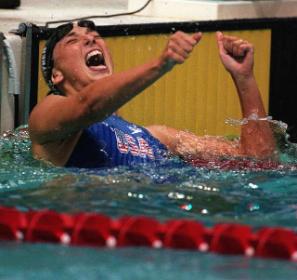
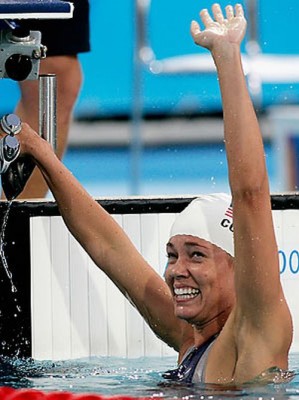
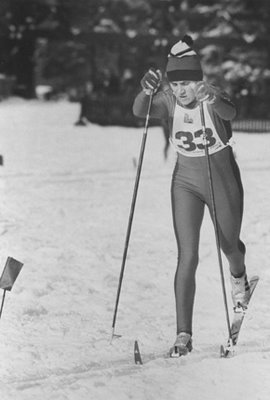

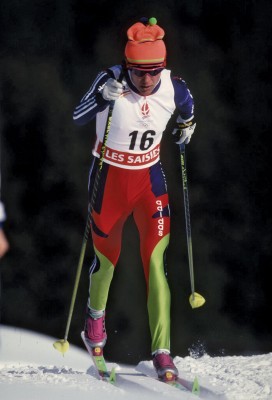
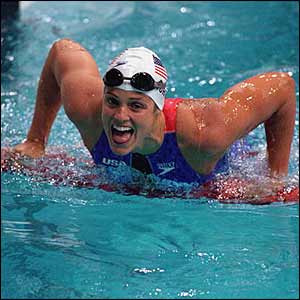
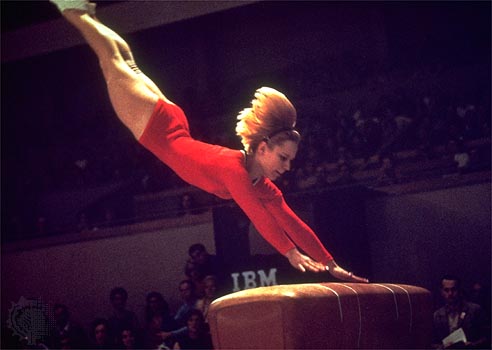
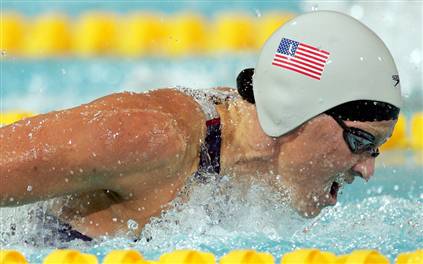
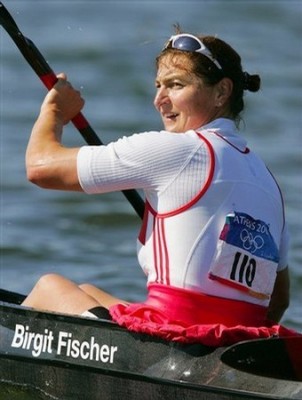
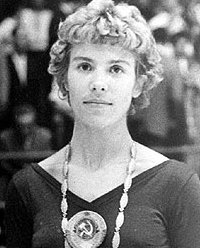
26 Comments
Yegorova was found gilty in taking performance enhanced drugs in 2002. Just sayin’..
Katarina Witt (figure skating), Fanny Blankers Koen (track and field), Babe Didrickson (track and field), Jackie Joyner Kersee (track and field), Olga Korbut (gymnastics), Dawn Fraser (swimming), Fu Ming-Xia (diving), Bonnie Blair, (Speed Skating), Mary Lou Retton (gymnastics), Sonia Henje (figure skating), Canadian Women’s Ice Hockey Team, Patricia McCormack (diving), Wilma Rudolph (track and field), Wyomia Tyus (track and field), 1976 East Germany women’s swim team starring Kornelia Ender, Ludmilla Tereshkova (gymnastics), the late Florence Griffith Joyner (track and field), Jenny Thompson (swimming)
Shall I dig deeper into the list that I have accumulated ????
Nadia is no. 1.
made them as an inspiration, so we are able to succeed like them.
Marit Bjorgen???
MICHELLE KWAN. Greatest.
Where's Kerri Strug?!?
Granted, as a Canadian, I'm a little biased here…but I'd think you would have to include Clara Hughes. I'm not aware of too many Olympians who have participated in both the Summer and Winter Olympics…much less won medals in both. Over her career in speed skating and cycling she has won a gold medal (speed skating), one silver (speed skating), and 4 bronze medals, (cycling and speed skating).
Typical American list. They seem to think the level of athletic brilliance is directly related to the number of medals they have won. Quantity over quality. What about those athletes who compete in events where there is only one gold to win (e.g. Judo). These people train their whole life for one chance at gold. If the number of medals determines ones greatness then obviously athletes like gymnasts and swimmers are going to top the list. A swimmer can win 7 gold medals by swimming a little bit further or changing their technique slightly. If greatness was determined by dignity, honour and humility there wouldn't be many Americans on the list.
So you are saying Americans, as a rule, don't have dignity, honor or humility? You paint us all with a wide brush, my friend. Be careful what you say, you don't want to be thought of as American.
No I am not saying Americans, as a rule, don’t have dignity, honour or humility, just the athletes and in various combinations. Americans have a terrible culture in sports where winning is everything. When they do win they rub it in the oppositions face and are loud and arragont. When they lose its like they have been shot. This is not the case with many or even most but America is the best known for it in the world. Just trying your hardest and leaving with a smile on your face makes you a great athelete.
I'm so proud that people want Nadia on this list, because I'm half Romanian
@rachid
I'm so proud to be a "full" Romanian! 😉
without Nadia, this list is dead on arrival
the greatest olympian ever is just that, shes not a summer olympian and shes not a winter olympian, shes both, Canadian Clara Hughes , the multi medalist in both the summer and winter olympics (cycling/speed skating) , no other olympian has accomplished that feat.
absolutely! She’s now 40 years old and still our most talented athlete! Go Clara!
Some great posts and many thanks for all your comments! Whether you agree with the Luchies Olympic Formula (LOF), let’s not forget that my selection of this list was based on that key factor. Using this formula, Nadia Comaneci received five five golds, three silvers and one bronze for a total of 36 points, and therefore, I stand to be corrected as she did in fact place as number nine on this list nudging out Amy Van Dyken. As for comparing simple career numbers versus peak performance, let’s not forget Birgit Schmidt-Fischer, Dara Torres, and Raisa Smetanina all made the list using the same formula. Finally, the potentially inflated numbers for swimmers for team medals could also be true of gymnast, but again remember, efforts at objectivity was made by equally applying the LOF. Thanks again for bringing Nadia Comaneci to my attention. My oversight was certainly not intentional.
Very US-centric choices of swimmers. No argument with Jenny Thomson, but the others were decent swimmers with their numbers inflated by virtue of being in US relay teams. Dawn Fraser or Krisztina Egerszegi were far greater swimmers, without the artificial relay numbers to push them along.
nice list but i'm preety sure that number one is Nadia Comaneci but nice job
Nadia isn't exactly number one but it should bee in the list
This is a good list but… it's hard to accept this list as a 'greatest' list when athletes like Jackie Joyner-Kersee, Bonnie Blair, Nadia Comaneci, Tracy Caulkins, Florence Griffith Joyner, etc aren't included. Nadia, for example, is considered by many as the greatest gymnast of all-time yet she barely makes the list at 9 (thanks TopTenz Master) and even gets beaten by 4 other gymnast based on the parameters used. I also expected to see Olga Korbut in here somewhere…
This list is more like comparing simple career numbers vs peak performance.
Rachid and Trixie – I also agree. Nadia had the following medal count:
Gold 1976 Montréal All-Around
Gold 1976 Montréal Uneven Bars
Gold 1976 Montréal Balance Beam
Gold 1980 Moscow Balance Beam
Gold 1980 Moscow Floor
Silver 1976 Montréal Team
Silver 1980 Moscow Team
Silver 1980 Moscow All-Around
Bronze 1976 Montréal Floor
5 gold x 5 points = 25 points
3 silver x 3 points = 9 points
1 bronze x 2 points = 2 points
total = 36 points
This puts her at #9 and should push out Amy.
Rachid beat me to it.. I recognize a top ten list can't include everyone, but seeing as how 4 gymnasts made this list, I don't see how Nadia could not have been one of them.
where is nadia comaneci???? she is the gratest gymnast in history!
Indeed, without Nadia, this list is null and void.